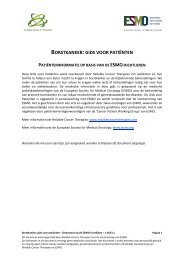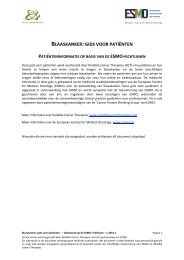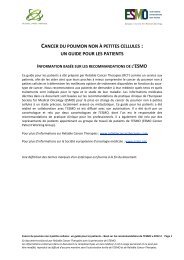Bladder cancer - European Society for Medical Oncology
Bladder cancer - European Society for Medical Oncology
Bladder cancer - European Society for Medical Oncology
You also want an ePaper? Increase the reach of your titles
YUMPU automatically turns print PDFs into web optimized ePapers that Google loves.
Chemotherapy*<br />
The standard combination regimen consists of the drugs cisplatin* with gemcitabine*<br />
(abbreviated as GC) or methotrexate*, vinblastine*, doxorubicin* and cisplatin (abbreviated as<br />
MVAC). The MVAC regimen causes more toxic side effects* than GC. Patients with limited<br />
advanced disease (lymph node* involvement and no visceral*<br />
metastasis* in organs*) and those who are medically fit may be able<br />
to receive high‐dose MVAC in combination with granulocyte‐colony<br />
stimulating factor* (G‐CSF), a growth factor that can increase<br />
tolerability of the chemotherapy.<br />
Approximately half of patients are medically not fit to tolerate<br />
cisplatin due to a poor general condition, poor kidney function or<br />
the presence of other diseases. These patients are treated with carboplatin* and gemcitabine*<br />
(abbreviated CG), with methotrexate*, carboplatin and vinblastine (abbreviated M‐CAVI) or with<br />
taxane* or gemcitabine only. CG is the reference treatment. M‐CAVI causes slightly more toxic<br />
effects than CG.<br />
Surgery and radiotherapy* after systemic chemotherapy*<br />
For selected patients with locally advanced disease systemic chemotherapy followed by<br />
cystectomy and lymphadenectomy*, or radiotherapy could be considered.<br />
Radiotherapy*<br />
Radiotherapy can be useful to alleviate pain or bleeding.<br />
Treatment of complications caused by disease<br />
Blockade of urinary flow<br />
<strong>Bladder</strong> <strong>cancer</strong> may block the flow of urine and cause urine to accumulate in the kidney. This may<br />
cause pain and disturbance of the kidney function. If cystectomy* is not possible because of<br />
advanced disease or because the patient is medically not fit to undergo this procedure, it may be<br />
necessary to divert urine flow away from the bladder to the exterior. This can be done by surgically<br />
connecting the kidney or the ureter* to the skin of the abdomen. This is called nephrostomy and<br />
ureterostomy, respectively. The urine is collected in a plastic bag attached to the skin.<br />
<strong>Bladder</strong> <strong>cancer</strong>: a guide <strong>for</strong> patients‐ In<strong>for</strong>mation based on ESMO Clinical Practice Guidelines ‐v.2012.1 Page 15<br />
This document is provided by Reliable Cancer Therapies with the permission of ESMO.<br />
The in<strong>for</strong>mation in this document does not replace a medical consultation. It is <strong>for</strong> personal use only and cannot be modified,<br />
reproduced or disseminated in any way without written permission from ESMO and Reliable Cancer Therapies.
















